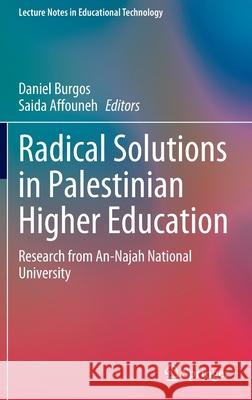Radical Solutions in Palestinian Higher Education: Research from An-Najah National University » książka
topmenu
Radical Solutions in Palestinian Higher Education: Research from An-Najah National University
ISBN-13: 9789811901003 / Angielski / Twarda / 2022 / 176 str.
Radical Solutions in Palestinian Higher Education: Research from An-Najah National University
ISBN-13: 9789811901003 / Angielski / Twarda / 2022 / 176 str.
cena 442,79
(netto: 421,70 VAT: 5%)
Najniższa cena z 30 dni: 424,07
(netto: 421,70 VAT: 5%)
Najniższa cena z 30 dni: 424,07
Termin realizacji zamówienia:
ok. 22 dni roboczych.
ok. 22 dni roboczych.
Darmowa dostawa!
This book brings together education research and practice carried out by An-Najah National University, a lead Higher Institution in Palestine that managed to move from a face-to-face setting to a fully online learning and teaching environment during the initial COVID-19 outbreak, within a month, seamlessly, which makes a success cases study of virtualization. This book concentrates on approaches to ensure the continuous improvement and quality of higher education provision across the country, with particular focus on: a) learning and teaching methodologies in online settings; b) use of open education as a key resource; and c) development of academic capability building, along with academic and knowledge exchange with other higher education partners. Innovative ideas, best practices, and comparative case studies are presented, discussed, and compared with international ones to make specific recommendations for a successful and sustainable implementation.











